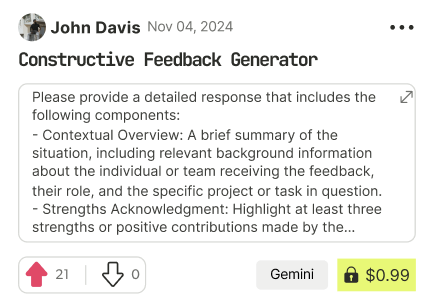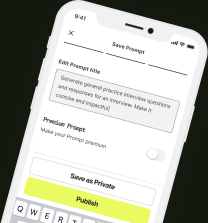prompt mine App
Find, Create & Share AI Magic
10 Stress Management Techniques for a 17-Year-Old Muslim Malaysian Girl in Boarding School
Okay, here are 10 effective and practical stress management techniques that can be easily incorporated into a daily routine, blending short-term relief with long-term resilience:
**1. Mindful Moment - The "5-4-3-2-1" Grounding Technique (Short-Term):**
* **What it is:** A quick, accessible mindfulness exercise that engages your senses to bring you back to the present moment and interrupt racing thoughts.
* **How to do it:** When feeling overwhelmed, take a few deep breaths and slowly acknowledge:
* **5 things you can SEE** around you (e.g., "I see a blue wall, a potted plant, a computer screen...").
* **4 things you can TOUCH** (e.g., "I feel my chair, my keyboard, my clothes...").
* **3 things you can HEAR** (e.g., "I hear the hum of the air conditioner, birds chirping, someone typing...").
* **2 things you can SMELL** (e.g., "I smell coffee, the faint scent of flowers...").
* **1 thing you can TASTE** (e.g., "I taste the lingering flavor of my breakfast...").
* **Why it works:** This technique pulls you out of your head and anchors you in your immediate environment, reducing anxiety and promoting a sense of calm. It's discreet and can be done anywhere, anytime.
**2. Deep Breathing Exercises - Diaphragmatic Breathing (Short-Term & Long-Term Benefits):**
* **What it is:** Consciously focusing on breathing deeply from your diaphragm, rather than shallowly from your chest.
* **How to do it:** Lie down or sit comfortably. Place one hand on your chest and the other on your stomach. Inhale slowly through your nose, allowing your stomach to rise (the hand on your chest should barely move). Exhale slowly through your mouth, pushing all the air out of your stomach. Repeat for 5-10 minutes. You can also practice the 4-7-8 breathing technique: Inhale for 4 seconds, hold your breath for 7 seconds, and exhale slowly through your mouth for 8 seconds.
* **Why it works:** Diaphragmatic breathing activates the parasympathetic nervous system (the "rest and digest" system), which slows heart rate, lowers blood pressure, and promotes relaxation. Consistent practice increases resilience to stress.
**3. Strategic Scheduling - Time Blocking and Priority Matrix (Long-Term):**
* **What it is:** Deliberately allocating specific blocks of time for tasks in your schedule and using a matrix (like Eisenhower's Urgent/Important Matrix) to prioritize tasks based on their urgency and importance.
* **How to do it:** At the beginning of each day (or week), identify your most important tasks. Block out specific times for them in your calendar, treating these blocks as non-negotiable appointments. Use the Urgent/Important matrix to categorize tasks:
* **Urgent & Important:** Do immediately.
* **Important, Not Urgent:** Schedule time to do them.
* **Urgent, Not Important:** Delegate if possible.
* **Neither Urgent nor Important:** Eliminate.
* **Why it works:** Time blocking provides structure and reduces the feeling of being overwhelmed. The priority matrix helps you focus on what truly matters, minimizing time spent on less productive activities.
**4. Active Breaks - "Movement Snacks" (Short-Term & Long-Term Benefits):**
* **What it is:** Integrating short bursts of physical activity throughout the day.
* **How to do it:** Set an alarm to remind you to get up and move every 30-60 minutes. Engage in simple exercises like stretching, walking around the office, doing jumping jacks, or climbing stairs. Even 5-10 minutes of movement can make a difference.
* **Why it works:** Physical activity releases endorphins, which have mood-boosting effects. It also improves focus and reduces muscle tension. Consistent movement throughout the day combats the negative effects of prolonged sitting and promotes overall well-being.
**5. Digital Detox - Scheduled Unplugging (Long-Term):**
* **What it is:** Intentionally disconnecting from digital devices (phones, computers, tablets) for a designated period of time.
* **How to do it:** Schedule specific times each day (e.g., after dinner, one hour before bed) or one day a week (e.g., Sunday mornings) to completely unplug. Turn off notifications, put your phone in another room, and resist the urge to check email or social media.
* **Why it works:** Constant connectivity can be overwhelming and contribute to stress. Unplugging allows you to relax, recharge, and focus on other activities, fostering a healthier relationship with technology.
**6. Expressive Outlets - Journaling or Creative Activities (Long-Term):**
* **What it is:** Using writing or other creative activities (painting, drawing, playing music) as a way to process emotions and reduce stress.
* **How to do it:** Set aside 15-30 minutes a few times a week to journal about your thoughts and feelings, or engage in a creative activity you enjoy. Don't worry about being perfect; the goal is simply to express yourself.
* **Why it works:** Journaling and creative activities provide a healthy outlet for emotions, helping you gain clarity, reduce emotional buildup, and improve self-awareness.
**7. Cultivating Gratitude - Daily Gratitude Practice (Long-Term):**
* **What it is:** Making a conscious effort to focus on and appreciate the positive aspects of your life.
* **How to do it:** Each day, write down 3-5 things you are grateful for. This can be done in a journal, in a note on your phone, or simply mentally. Focus on the specific details of what you appreciate.
* **Why it works:** Gratitude shifts your focus from what's lacking to what you have, promoting feelings of happiness, contentment, and resilience.
**8. Social Connection - Prioritizing Meaningful Interactions (Long-Term):**
* **What it is:** Making time for genuine connection with friends, family, or supportive colleagues.
* **How to do it:** Schedule regular phone calls, coffee dates, or social activities with people you enjoy and who support you. Engage in active listening and be present during these interactions.
* **Why it works:** Social connection provides a sense of belonging, reduces feelings of isolation, and offers emotional support during stressful times.
**9. Progressive Muscle Relaxation (PMR) - Body Scan and Tension Release (Short-Term & Long-Term):**
* **What it is:** A technique to relieve muscle tension throughout the body by systematically tensing and relaxing different muscle groups.
* **How to do it:** Start by finding a quiet and comfortable place to sit or lie down. Systematically tense and relax each muscle group in your body, starting with your toes and moving up to your head. Hold the tension for 5-10 seconds, then release it slowly and completely, paying attention to the sensation of relaxation.
* **Why it works:** PMR can alleviate physical symptoms of stress such as muscle tension, headaches, and fatigue.
**10. Setting Boundaries - Learning to Say "No" (Long-Term):**
* **What it is:** Identifying your limits and assertively communicating them to others.
* **How to do it:** Before agreeing to a request, take a moment to consider your capacity and priorities. If you don't have the time or energy, politely decline. Use phrases like, "I appreciate the offer, but I'm not able to take that on right now," or "I'd love to help, but my schedule is full."
* **Why it works:** Setting boundaries prevents you from becoming overcommitted, reduces feelings of resentment, and protects your time and energy for what truly matters. It allows you to prioritize your own well-being.
It’s important to remember that finding the right combination of techniques is a personal journey. Encourage individuals to experiment with different strategies and find what works best for them and their unique circumstances. Consistent practice is key to developing resilience and effectively managing stress.

Find Powerful AI Prompts
Discover, create, and customize prompts with different models, from ChatGPT to Gemini in seconds

Simple Yet Powerful
Start with an idea and use expert prompts to bring your vision to life!

